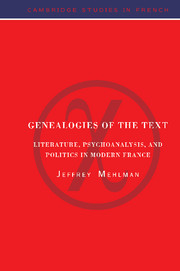Book contents
- Frontmatter
- Contents
- Acknowledgments
- 1 Introduction
- 2 Craniometry and criticism: notes on a Valéryan criss-cross
- 3 Literature and hospitality: Klossowski's Hamann
- 4 Literature and collaboration: Benoist-Méchin's return to Proust
- 5 “Pierre Menard, author of Don Quixote” again
- 6 Iphigenia 38: deconstruction, history, and the case of L'Arrêt de mort
- 7 Writing and deference: the politics of literary adulation
- 8 Perspectives: on Paul de Man and Le Soir
- 9 Prosopopeia revisited
- 10 The paranoid style in French prose: Lacan with Léon Bloy
- 11 The Holocaust comedies of “Emile Ajar”
- 12 Pour Sainte-Beuve: Maurice Blanchot, 10 March 1942
- 13 Flowers of evil: Paul Morand, the Collaboration, and literary history
- Appendix
- Notes
- Index
- Series list
10 - The paranoid style in French prose: Lacan with Léon Bloy
Published online by Cambridge University Press: 19 January 2010
- Frontmatter
- Contents
- Acknowledgments
- 1 Introduction
- 2 Craniometry and criticism: notes on a Valéryan criss-cross
- 3 Literature and hospitality: Klossowski's Hamann
- 4 Literature and collaboration: Benoist-Méchin's return to Proust
- 5 “Pierre Menard, author of Don Quixote” again
- 6 Iphigenia 38: deconstruction, history, and the case of L'Arrêt de mort
- 7 Writing and deference: the politics of literary adulation
- 8 Perspectives: on Paul de Man and Le Soir
- 9 Prosopopeia revisited
- 10 The paranoid style in French prose: Lacan with Léon Bloy
- 11 The Holocaust comedies of “Emile Ajar”
- 12 Pour Sainte-Beuve: Maurice Blanchot, 10 March 1942
- 13 Flowers of evil: Paul Morand, the Collaboration, and literary history
- Appendix
- Notes
- Index
- Series list
Summary
For some time now I have had on my desk three brief passages which might serve as epigraphs for these pages, but which I am inclined to think of as pieces in an elaborate jigsaw puzzle or mosaic that remains to be assembled. The first is Drieu la Rochelle's epitomization of Celine: “Céline, c'est Léon Bloy moins Dieu.” The second is a rather pregnant allusion to Léon Bloy's Le salut par les juifs in Lacan's Seminar: Freud as the prototypal Jew in Bloy's sense of the term. The third is from the first volume of Foucault's history of sexuality. It concerns what he calls the “political honor of psychoanalysis,” its “theoretical and practical opposition to fascism,” which lay in reintroducing an archaic political dimension – of the law, of sovereignty, and of the symbolic order – into the newly emergent and tendentially totalitarian realm (or “analytic”) of sexuality. It is, then, the politics of a certain archaic strand in Lacan's prose and its affinities with the figure of the Sovereign – be he God or Father – in Bloy which form the horizon against which these remarks are offered. That the absence – or elimination – of such a strand in the case of psychoanalysis would modulate toward fascism (according to Foucault) and in that of Bloy toward Céline (according to Drieu) provides both an implicit confirmation of the homology herein constructed and an indication of the political perils it skirts.
Let me begin with one of Bloy's Histoires désobligeantes. It is called “Propos digestifs,” “Table Talk,” and is at once a superb introduction to Bloy and to his affinities with Lacan.
- Type
- Chapter
- Information
- Genealogies of the TextLiterature, Psychoanalysis, and Politics in Modern France, pp. 139 - 153Publisher: Cambridge University PressPrint publication year: 1995



